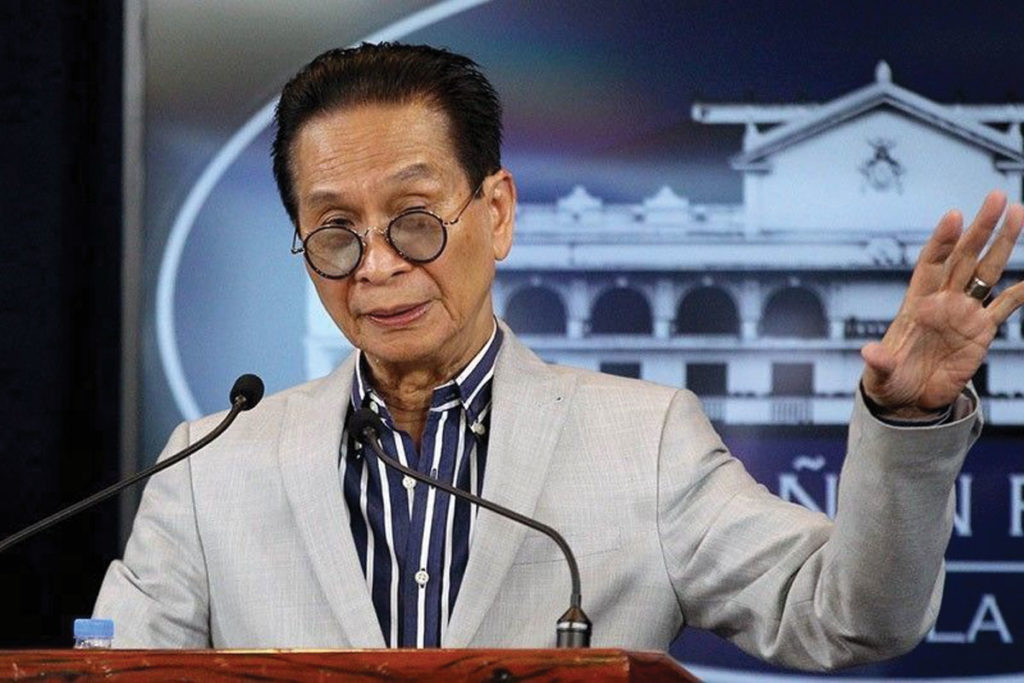
President Rodrigo Duterte’s order to suspend aid agreements with countries in favor of the Iceland-led United Nations resolution seeking a probe into his anti-drug campaign will not harm the Philippine economy, Malacañang assured on Monday, September 23.
During a press briefing, presidential spokesperson Salvador Panelo clarified, “At the outset, we assure the nation and its citizenry that this directive will not have a negative and significant impact on the country.”
Finance Secretary Carlos Dominguez added that the suspension would not affect loans or grants that are already being implemented.
The Philippines has existing grants from Australia ($228.89 million), Germany ($151.31 million), France ($6.72 million), Italy ($4.71 million) and Spain ($570,000). France and Germany, who also sponsored the UN resolution, were not among the 18 countries that voted in favor of it.
“All proposed engagements with said countries except for one small project loan in the amount of 21 million euros are technical assistance grants and hence will not significantly affect the infrastructure program of the government,” Dominguez said.
In July, Iceland filed a resolution calling on rights chief Michelle Bachelet to investigate the human rights situation and prepare a comprehensive report to be presented before the United Nations Human Rights Council.
The 18 countries who voted favorably for the resolution calling for a “comprehensive report” on the human rights situation in the Philippines were Argentina, Australia, Austria Bahamas, Bulgaria, Croatia, Czech Republic, Denmark, Fiji, Iceland, Italy, Mexico, Peru, Slovakia, Spain, Ukraine, United Kingdom, and Uruguay.
The 14 countries who opposed were Angola, Bahrain, Cameroon, China, Cuba, Egypt, Eritrea, Hungary, India, Iraq, Qatar, the Philippines, Somalia and Saudi Arabia, while the 15 others that abstained from voting were Afghanistan, Bangladesh, Brazil, Burkina Faso, Chile, Democratic Republic of Congo, Japan, Nepal, Nigeria, Pakistan, Rwanda, Senegal, South Africa, Togo and Tunisia.
The Philippine National Police in June released data that claimed a total of 6,600 drug suspects have been killed in the anti-drug operations since Duterte took office on July 2016. However, human rights groups argue that the number has reached over 20,000 killed in extrajudicial circumstances.
‘A big loss’
Senator Francis Pangilinan on Monday raised concerns on the suspension of all loan and grant talks from countries that backed the UN resolution to investigate the Philippines’ war on drugs, saying that it isolates the country more.
In an interview with the CNN Philippines, Pangilinan said that that the countries that voted favorably for the Iceland-led UN resolution are “not small.”
“These aren’t small countries — Australia, UK, Italy and Spain — and then they said this is around P20 billion-plus so that is a big loss,” he said.
Pangilinan also pointed out that the order will affect direct investments from these countries.
“We’re actually isolating ourselves more,” he said.
On the other hand, Foreign Affairs Secretary Teodoro Locsin Jr. was in favor of the directive, saying the memo was “a good idea.”
“We don’t need the money; we’ve more than enough without turning to anyone outside except Japan of course whose generosity is unconditional, quick; and whose motivation is honestly to help the Philippines,” Locsin said in a tweet on Friday, September 20.
He also said that the Department of Finance had stopped receiving grants from European countries even before Iceland filed the resolution before the UNHRC.
“That’s old stuff actually; long before the failed Iceland resolution. DOF didn’t like them; not worth the candle considering the amounts and the terms and the money goes mostly to consultants,” Locsin tweeted Saturday, September 21.
Malacañang issued last August 27 the memorandum directing agencies to suspend negotiations for and signing of all loan grant agreements with the governments of countries that co-sponsored and voted in favor of the resolution.
The memo was issued “in light of the administrations’ strong rejection of the resolution of the United Nations Human Rights Council.”
Lapse in memory
Panelo on Friday denied that Duterte signed a memorandum about the suspension of all aid talks and offers from the countries that were in favor of the Iceland-led resolution.
“The president has not issued any memorandum suspending loans and negotiations involving 18 countries that voted in favour of the Iceland resolution,” he said over the weekend.
However, Panelo recanted his statement on Monday, claiming that Duterte had forgotten about the order when he spoke to him.
“It was not I who is denying. When I asked him, he said, ‘no, I did not.’ Apparently, as I said, he might have forgotten momentarily. So, when I asked him again he said, ‘yes I remember calling the (executive) secretary about it,’” he said.
“That is more [of] the lapse in memory…because when I asked him again, he said, ‘Yes I did.’ But what is important is that memo exists and it is maintained,” Panelo added.





